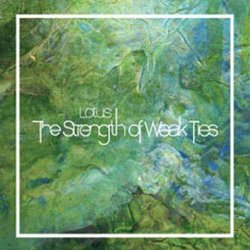| All Artists: Lotus Title: Strength of Weak Ties Members Wishing: 0 Total Copies: 0 Label: Harmonized Original Release Date: 1/1/2006 Re-Release Date: 4/4/2006 Genres: Alternative Rock, Pop, Rock Styles: Indie & Lo-Fi, Adult Alternative Number of Discs: 1 SwapaCD Credits: 1 UPC: 710184739923 |
Search - Lotus :: Strength of Weak Ties
 | Lotus Strength of Weak Ties Genres: Alternative Rock, Pop, Rock
|
Larger Image |
CD Details |
CD ReviewsOn live and studio performances. Eric J. Wohnlich | MD United States | 04/11/2006 (5 out of 5 stars) "For a band like Lotus, I think it is important to understand their studio releases in conjunction with their live performances - and fortunately I was able to seem them on the same day I bought this CD. The last two times I have seen them live, they played for about 4 hours of ethereal, electronically-fused, jam music with something of a jazz/rock/funk base. There is certainly a lot of improvisation, but the emphasis is on cohesive grooves and not, like much jazz, on solos. This, coupled with an emphasis on minimalism, reinforces an ethereal, other-wordly feeling. Nomad, their first and previously latest studio album, seemed to completely miss this aspect of their music. The jams were too polished to really be jams, and yet there were no really strong melodies. They turned out to make great concert pieces, but this only supported my belief that Lotus would be better off avoiding the studio and instead recording everyone of their concerts for maybe $3 or $4 a pop, to fans who would certainly gobble it up. (I still think this is a good idea, although many of their concerts are available to download anyway) The Strength of Weak Ties has shown that Lotus is indeed capable of using the studio as a unique creative tool. Unlike Nomad, it has some memorable melodies (while maintaining great grooves), and unlike their first (a live album) Germination, it offers something not easily matched in a live performance (in other words, the best candidate of the three for an album). This album also breaks new ground for Lotus in two, seemingly divergent, ways. First, there is a more mainstream/pop side to the band. This is partly due to their application of synthesizers (of which they use more here than in concert) in more of a house style, and surely due to their inclusion of a guest singer on a few (the more poppy) pieces. However, there are certainly no outright commercial fluff pieces - even the opener, Tip of the Tongue (perhaps the closest to this), has some adventurous (comparatively) dissonant phrases that would be inappropriate to a pop piece. It also has a light funk quality to it, which would place them more in the realm of soft jazz than pop. Secondly, some of the pieces are LESS poppy and like electronica-dance than on Nomad or Germination. Perhaps most of the heart of this album is that way - from When H Binds to O through Epidemic. Here they venture more towards MM&W, or electronica-jazz outfits like Jaga Jazzist. (At one point on When H Binds to O they even reminded me of King Crimson - but I fear that only goes to show my own background in prog). Some of these are much less minimalistic than Nomad. Nomad was characterized by the majority of pieces centering on one theme, and a progression of at most two chords. If you were to play along, you could easily keep the same root on most pieces. On The Strength of Weak Ties, the pieces are still fairly simple for the most part, but certainly more complex than Nomad. Blue Giant is a good example of one of those pieces with more thematic complexity (again, this is only in relevance) than their earlier work, while still keeping some cool grooves. Kesey Seed is one of the pieces I am not quite sure about. I loved hearing this live in concert and on bootlegs, and wondered why they had not included it on Nomad. This version is significantly different from the live performances though. Right now I think the live version had more energy and a nice mysticism, however I think it is too early to know if I am being objective or simply wishing for the piece I have already known. The album ends with two less memorable pieces. Cirrus is a soft blues piece somewhat similar to Colorado on Nomad. For the most part, I felt less a sense of Rempel on this than in concerts or Nomad, but I really heard him here. Unfortunately, this is, in my opinion, not one of the better pieces here. On a final note, I dig the artwork - an abstract painting with cool colors. Very Lotus." Lotus matures Eclectic Electric | Washington, DC | 05/08/2006 (4 out of 5 stars) "On TSOWT, Lotus expandes their style and proves to be a multidimensional, eclectic band. As with any musical experimentation, this first outing may be a surprise to fans of their previous releases and live performances. For the majority of the album, Lotus moves away from the housey beats and guitar-based melodies of Nomad and Germination. At its best, songs such as 'Blue Giant' and 'Bubonic tonic' are excellent soundscapes with patented Lotus groove that take you into a trancendent state. There are some songs, including 'When H binds to O' and 'Drunken Giraffe without as clear a melodic message and more of a jazz feel than the quentiessential Lotus song. Although these are interesting, worthwhile songs they are also a large departure from the dance-infused live shows and releases. Perhaps we can take this as a sign that Lotus will continue to keep us on our toes.
" |

 Track Listings (10) - Disc #1
Track Listings (10) - Disc #1